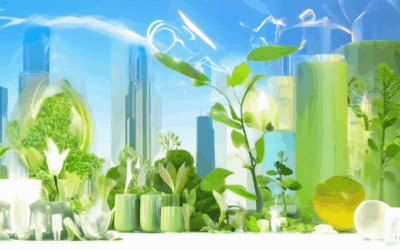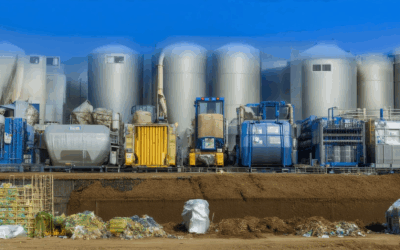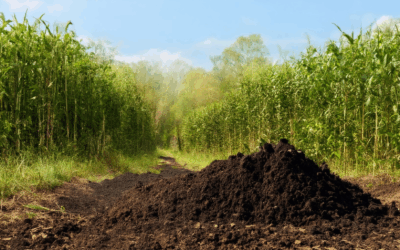Grilling has long been a beloved pastime, but have you ever considered the environmental impact of your cooking methods? While traditional charcoals may seem convenient, they often come with hidden costs to the planet. Enter eco-friendly biochar—a sustainable alternative that not only enhances your grilling experience but also aligns with a greener lifestyle. Made from carefully processed organic materials, biochar emerges as a cleaner, more efficient fuel option that minimizes waste and reduces reliance on non-renewable resources. By choosing biochar, you’re contributing to a healthier planet while enjoying the same rich, smoky flavors you love. In this article, we’ll delve into why biochar stands out as a superior choice for those seeking environmentally responsible grilling solutions.
Key Takeaways
– Biochar Captures Carbon Efficiently: Stores carbon in its porous structure, aiding in climate change mitigation.
– Enhanced Water Retention: Improves soil moisture, ideal for drought-prone regions.
– Natural Soil Amendment: Boosts soil fertility and structure, promoting healthy plant growth.
– Low Environmental Impact: Produces fewer greenhouse gases and uses organic waste.
– Reduces Deforestation: Made from non-timber sources, avoiding forest depletion.
– Reduces Landfill Waste: Converts organic waste into biochar, decreasing landfill contributions.
– Improves Air Quality: Controlled pyrolysis lowers emissions, fostering cleaner air.
– Supports Sustainable Farming: Reduces reliance on chemical fertilizers, promoting eco-friendly practices.
– Fights Desertification: Restores degraded soils, enhancing ecosystem resilience.
– Eco-Friendly Process: Diverts waste from landfills and reduces synthetic fertilizer use.

What Makes Biochar a Sustainable and Eco-Friendly Choice?
Biochar is a versatile and sustainable material derived from the pyrolysis of organic waste, making it an excellent choice for various applications. Its production process not only converts waste into a valuable resource but also contributes positively to environmental health and sustainability efforts.
Key Benefits of Biochar
- Waste Reduction: Biochar is created from organic waste, reducing the amount sent to landfills and lowering methane emissions, a potent greenhouse gas.
- Soil Enrichment: Rich in carbon, biochar improves soil fertility, promoting healthier plant growth and reducing the need for chemical fertilizers. This leads to better nutrient absorption and stronger root systems in plants.
- Carbon Sequestration: As biochar remains in the soil, it acts as a long-term carbon sink, helping to mitigate climate change by absorbing and storing carbon dioxide.
The Versatility of Biochar
Biochar can be applied across multiple industries, making it a multi-functional solution:
- Agriculture: Enhances crop yields, improves soil structure, and increases resistance to pests and diseases.
- Urban Settings: Used as a growing medium for urban gardens and in composting processes to support local food production.
- Energy Production: Processed further to create biochar-based products, adding value to waste materials and promoting circular economy practices.
Comparison with Traditional Methods
Traditional farming practices often rely on synthetic fertilizers, which are energy-intensive and contribute to environmental degradation. Biochar offers a more sustainable alternative by providing a natural solution to enhance soil health and reduce reliance on harmful chemicals.
Competitors and Market Leaders
Several companies specialize in biochar production, each bringing unique innovations to the market. Companies like Carbon Gold and TerraCORE are notable players, contributing to the advancement of biochar technology and its adoption across various sectors.
Conclusion
Biochar stands out as a sustainable and eco-friendly choice due to its ability to reduce waste, enrich soil, and sequester carbon. Its versatility across industries makes it a valuable tool for promoting environmental sustainability and supporting sustainable living practices.
By choosing biochar, individuals and businesses can actively contribute to a healthier planet while exploring innovative solutions to pressing global challenges.
Why Biochar is a More Eco-Friendly Option
Biochar offers several distinct advantages over traditional charcoal, making it a more sustainable choice:
- Carbon Sequestration: Biochar captures and stores carbon during its production, helping to reduce greenhouse gas emissions and combat climate change. In contrast, traditional charcoal typically does not trap carbon and may even contribute to increased CO2 levels when burned.
- Improved Soil Health: Biochar enhances soil fertility by adding essential nutrients and promoting microbial activity, leading to healthier plant growth and more robust ecosystems. Traditional charcoal often lacks these beneficial properties for soil.
- Higher Efficiency: Biochar burns hotter and longer, requiring less material to achieve the same effects. This reduces resource consumption and minimizes waste, making it a more efficient and sustainable option.
- Sustainable Production: Produced from organic waste materials like agricultural residues, biochar diverts waste from landfills and offers a valuable reuse, aligning with circular economy principles. Traditional charcoal often relies on non-sustainable resources.
- Versatility: Biochar has diverse applications, including agriculture, water filtration, and energy production, making it a multi-functional eco-friendly solution. Traditional charcoal is typically used for specific purposes, limiting its broader impact.

Environmental Benefits of Biochar Over Traditional Charcoal
Biochar offers several distinct environmental advantages over traditional charcoal, making it a more sustainable and eco-friendly option for various applications:
- Carbon Sequestration:** Biochar effectively traps and stores carbon, reducing greenhouse gas emissions and contributing to carbon sequestration efforts. This helps mitigate climate change by preventing excess carbon from entering the atmosphere.
- Soil Health Improvement:** Unlike traditional charcoal, biochar enhances soil fertility and structure. It adds essential nutrients and increases soil organic matter, promoting plant growth and ecosystem health.
- Water Retention:** Biochar has a higher porosity, allowing it to hold more water. This capability supports moisture retention in soil, reducing the risk of drought and minimizing irrigation needs.
- Pollutant Filtering:** Biochar acts as a natural filter, removing pollutants from water. When integrated into soil, it helps purify water, improving water quality and protecting aquatic ecosystems.
- Sustainability:** Produced from organic waste through pyrolysis, biochar promotes circular economy practices. It repurposes agricultural residues, reducing reliance on fossil fuels and minimizing environmental impact.
- Longer Lifespan:** Biochar remains active in the soil for extended periods, delivering sustained benefits compared to traditional charcoal, which degrades more quickly.
By choosing biochar over traditional charcoal, individuals contribute to a more sustainable future, supporting environmental health and promoting eco-friendly practices.

How Does Biochar Compare to Traditional Charcoal in Terms of Environmental Impact?
Biochar and traditional charcoal have distinct environmental impacts, with biochar generally offering a more sustainable and eco-friendly alternative. Here’s a breakdown of their differences:
1. Carbon Sequestration
Biochar is particularly effective at sequestering carbon. Produced through a controlled pyrolysis process, biochar captures and stores carbon in its porous structure, which can remain stable for decades. This carbon storage helps mitigate climate change by reducing greenhouse gas emissions.
2. Water Retention
Biochar enhances soil health by improving water retention capabilities. Its porous structure allows soil to hold onto moisture longer, reducing runoff and erosion, and promoting healthier plant growth. This benefit is particularly valuable in arid regions and areas prone to drought.
3. Soil Health
Traditional charcoal, especially when produced via slash-and-burn methods, can degrade soil quality. In contrast, biochar acts as a soil amendment, adding organic matter and improving soil fertility. It enhances microbial activity, promotes nutrient uptake, and increases soil resilience against various stressors.
4. Production Methods
The production of biochar typically involves a slower, controlled pyrolysis process, which emits fewer greenhouse gases compared to the rapid, high-temperature processes used for traditional charcoal. Biochar can also be made from organic waste materials, making it a more sustainable resource.
5. Land Use and Deforestation
Traditional charcoal production often relies on cutting down forests, contributing to deforestation and habitat loss. Biochar, on the other hand, can be produced from agricultural residues or urban waste, reducing the demand for timber and minimizing its environmental footprint.
Environmental Impact Summary
Biochar emerges as a more sustainable option due to its lower carbon emissions, improved soil health, and reduced reliance on deforestation. While both products can contribute to environmental goals, biochar’s production methods and benefits make it a preferable choice for eco-conscious individuals and industries.
For more information on biochar’s role in sustainable practices, check out our guide on Pyrolysis Process and how it contributes to Sustainable Agriculture .
Environmental Benefits of Using Biochar
Biochar offers numerous environmental benefits, making it a valuable tool for sustainable living and ecological preservation. Here are some key advantages:
- Carbon Sequestration: Biochar is rich in carbon, which can help capture and store carbon dioxide from the atmosphere. When incorporated into soil, it contributes to carbon storage, helping mitigate climate change and promoting carbon sinks.
- Reducing Landfill Waste: By converting organic waste into biochar, we decrease the amount of waste sent to landfills. This reduces methane emissions, a potent greenhouse gas produced as organic material decomposes in landfills.
- Improving Soil Health: Biochar enhances soil structure, increases fertility, and improves water retention. These benefits lead to better plant growth, higher agricultural yields, and stronger ecosystems.
- Combating Drought: Biochar improves soil moisture retention, which helps reduce the impact of droughts and enhances resilience in arid environments.
- Air Quality Improvement: The production of biochar through controlled pyrolysis captures emissions from combustion, contributing to cleaner air and reduced pollution.
- Supporting Sustainable Farming: As a natural fertilizer, biochar reduces reliance on chemical fertilizers, lowering associated pollution and promoting eco-friendly farming practices.
By utilizing biochar, individuals and communities can play a significant role in promoting environmental sustainability and supporting sustainable agriculture. Learn more about how biochar can transform waste into a resource and contribute to a healthier planet at Pyrolysium .

Environmental Benefits of Using Biochar
Biochar offers numerous environmental benefits, making it a valuable tool for sustainable living and ecological preservation. Here are some key advantages:
- Carbon Sequestration: Biochar is rich in carbon, which can help capture and store carbon dioxide from the atmosphere. When incorporated into soil, it contributes to carbon storage, helping mitigate climate change and reducing greenhouse gas emissions.
- Reducing Landfill Waste: By converting organic waste into biochar, we can significantly reduce the amount of waste sent to landfills. This not only decreases methane emissions (a potent greenhouse gas) but also minimizes the environmental impact of waste disposal.
- Improving Soil Health: Biochar enhances soil structure, increases fertility, and improves water retention. These benefits lead to more robust plant growth, higher agricultural yields, and better resistance to drought conditions.
- Aiding in Air Quality: The production of biochar through controlled pyrolysis captures emissions from combustion, reducing air pollutants. This makes the process more environmentally friendly compared to traditional charcoal production methods.
- Sustainable Agriculture: Biochar serves as a natural fertilizer, supplying essential nutrients to the soil. This reduces reliance on chemical fertilizers, which can contaminate water supplies and harm ecosystems.
- Combating Desertification: In regions affected by desertification, biochar can help restore degraded soils. Its ability to retain moisture and promote plant growth makes it an effective solution for reversing desert-like conditions.
- Eco-Friendly Process: The production of biochar from organic waste diverts materials from landfills and reduces the need for synthetic fertilizers and pesticides, promoting sustainable farming practices.
Incorporating biochar into various applications—from agriculture to waste management—supports a more sustainable and eco-conscious lifestyle. By utilizing biochar, individuals and communities can contribute positively to environmental conservation and work towards a healthier planet.




0 Comments